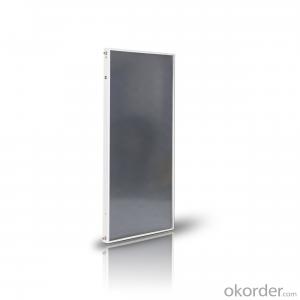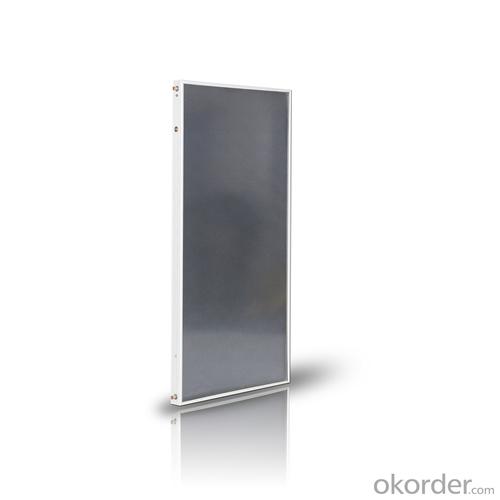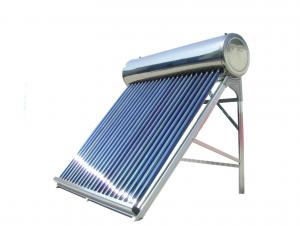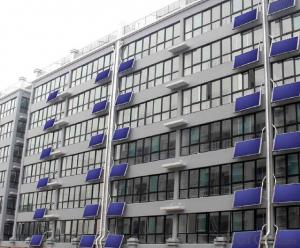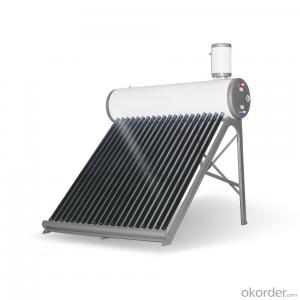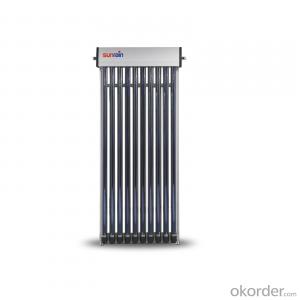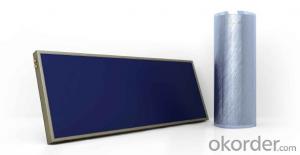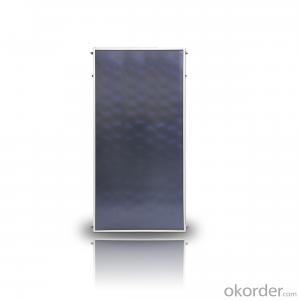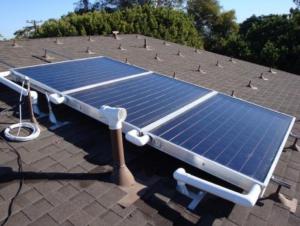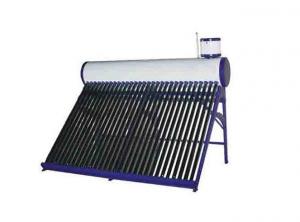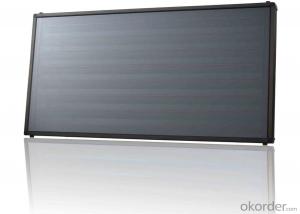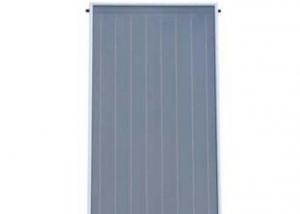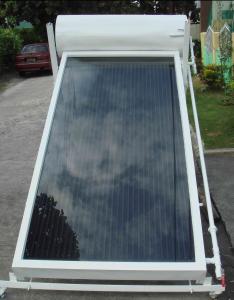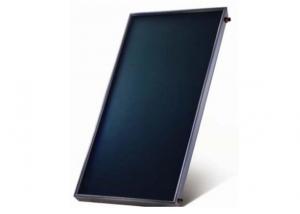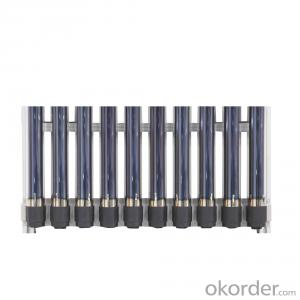Aet Solar Water Heater - Flat Plate Collector FPC1200D
- Loading Port:
- China Main Port
- Payment Terms:
- TT OR LC
- Min Order Qty:
- -
- Supply Capability:
- -
OKorder Service Pledge
Quality Product, Order Online Tracking, Timely Delivery
OKorder Financial Service
Credit Rating, Credit Services, Credit Purchasing
You Might Also Like
| Type | Flat Plate Collector |
| Pressure | Pressurized |
| Circulation Type | Indirect / Closed Loop (Passive) |
| Connection Type | Split |
| Certification | CE, Solar Keymark,AS/NZS2535,4020 |
| Model Number | FPC1200D |
| Recommend region | world wide |
Key points
. Easy installation, long service life. . Good insulation properties. Low decline speed according to environment temperature decline. It's better to be installed in above-zero environment.
. Adjustable, installation will not be affected by angle.
. It can be evacuated in winter for anti-freeze purpose.
. High blue selective coating, full plate laser welding technology, with high absorbing efficiency, operates with 6 bar pressure. Test pressure is 10 bar.
. Laser welding technology. Heat faster, and heat loss is smaller.
- Q: Can a solar water heater be used in areas with limited space for solar panels?
- Yes, a solar water heater can still be used in areas with limited space for solar panels. This is because solar water heaters typically require fewer panels compared to other solar energy systems. Additionally, there are compact and space-saving designs available that can be installed in constrained areas, including rooftops and balconies.
- Q: What is the cost of installing a solar water heater?
- The price of setting up a solar water heater can differ based on several factors, such as the system's size and type, the installation's location, and any necessary additional equipment or accessories. Typically, the expense of a solar water heater installation can range from $2,000 to $7,000. This covers the cost of the solar panels, the water storage tank, the plumbing and installation labor, and any required permits. It's important to acknowledge that although the initial cost of installing a solar water heater may appear steep, it can result in significant long-term savings on energy bills. Solar water heaters are extremely efficient and can reduce water heating expenses by 50-80% compared to conventional electric or gas-powered water heaters. Furthermore, there might be potential incentives or tax credits offered at the local, state, or federal level that can help offset the installation cost. It is advisable to conduct research and seek advice from local solar energy providers or government agencies to explore any available financial incentives. All in all, the price of installing a solar water heater can differ, but it is a worthy investment that can provide both financial savings and environmental advantages in the long term.
- Q: Can a solar water heater be used in areas with limited access to replacement parts?
- Yes, a solar water heater can be used in areas with limited access to replacement parts. Solar water heaters are relatively simple systems with fewer moving parts compared to conventional water heaters. They are designed to be durable and low-maintenance, thus reducing the need for frequent repairs or part replacements. Additionally, solar water heaters can be designed using locally available materials, making them more suitable for areas with limited access to replacement parts.
- Q: Are there any government incentives or tax credits available for solar water heaters?
- Yes, there are government incentives and tax credits available for solar water heaters. These incentives vary by country and region, but they are often provided to promote the use of renewable energy sources and reduce carbon emissions. In many cases, homeowners can receive federal or state tax credits, rebates, or grants for installing solar water heaters, which can help offset the initial costs and make them more affordable. It is advisable to check with local government authorities or energy agencies to find out specific incentives available in your area.
- Q: Can a solar water heater be used in areas prone to wildfires?
- Indeed, areas prone to wildfires can use solar water heaters. It is noteworthy that solar water heaters do not pose any direct fire risk themselves, unlike traditional heaters that depend on gas or electricity. Solar water heaters rely on the sun's energy, making them inherently safer in wildfire-prone regions. Nonetheless, it is crucial to consider overall safety measures and precautions when installing and operating a solar water heater in such areas. Here are some important points to consider: 1. Professional installation: Ensure a qualified professional installs the solar water heater, following all safety guidelines and regulations. The system should be securely anchored to prevent damage during high winds or wildfires. 2. Regular maintenance: Regularly inspect and maintain the system to ensure optimal performance. This includes cleaning, checking for leaks, and ensuring all components function properly. 3. Fire-resistant materials: Utilize fire-resistant materials, such as metal or concrete, for mounts, plumbing connections, and storage tanks associated with the solar water heater system. This reduces the risk of fire ignition or spreading. 4. Clear vegetation: Maintain a clear area around the solar water heater, removing dry vegetation or flammable materials that could fuel a fire. 5. Adequate insurance coverage: Ensure your homeowner's insurance policy covers solar water heaters and associated risks in case of wildfire or other damage. Staying updated with local regulations and guidelines regarding the use of solar water heaters in wildfire-prone areas is important. By following these safety measures and taking appropriate precautions, it is possible to safely use a solar water heater in such regions, providing an environmentally friendly and cost-effective method to heat water.
- Q: What is the average cost of maintenance for a solar water heater?
- The average cost of maintenance for a solar water heater can vary depending on various factors such as the type and size of the system, its age, and the specific maintenance requirements. However, on average, homeowners can expect to spend around $100 to $300 per year for routine maintenance, which may include inspections, cleaning, and replacing any necessary parts. It is important to note that these costs can be relatively low compared to the potential energy savings provided by a properly functioning solar water heater.
- Q: Can a solar water heater be used in areas with limited access to hydroelectric power?
- Yes, a solar water heater can be used in areas with limited access to hydroelectric power. Solar water heaters rely on the sun's energy to heat water, so they can operate independently of hydroelectric power. They are a sustainable and efficient alternative for providing hot water in areas where hydroelectric power is not readily available.
- Q: Can a solar water heater be used in areas with strict building codes?
- Yes, a solar water heater can be used in areas with strict building codes. However, it would be important to ensure that the solar water heater system meets all the necessary requirements and regulations outlined by the local building codes. This may involve obtaining proper permits, following specific installation guidelines, and adhering to safety standards. Consulting with local authorities or a professional installer experienced in navigating building codes would be advisable in order to ensure compliance and successful installation.
- Q: Can a solar water heater be used in areas with high snowfall?
- Yes, a solar water heater can be used in areas with high snowfall. However, it may require additional precautions such as insulation and snow removal to ensure its optimal performance.
- Q: How does the design of a solar water heater affect its efficiency?
- The design of a solar water heater has a significant impact on its efficiency. Factors such as the size and orientation of the collector, insulation, and the type of circulation system used can all affect how effectively the solar water heater harnesses and transfers solar energy to heat water. A well-designed solar water heater optimizes the absorption of solar radiation, minimizes heat loss, and maximizes the transfer of heat to the water, resulting in higher efficiency and better performance.
Send your message to us
Aet Solar Water Heater - Flat Plate Collector FPC1200D
- Loading Port:
- China Main Port
- Payment Terms:
- TT OR LC
- Min Order Qty:
- -
- Supply Capability:
- -
OKorder Service Pledge
Quality Product, Order Online Tracking, Timely Delivery
OKorder Financial Service
Credit Rating, Credit Services, Credit Purchasing
Similar products
Hot products
Hot Searches
Related keywords
